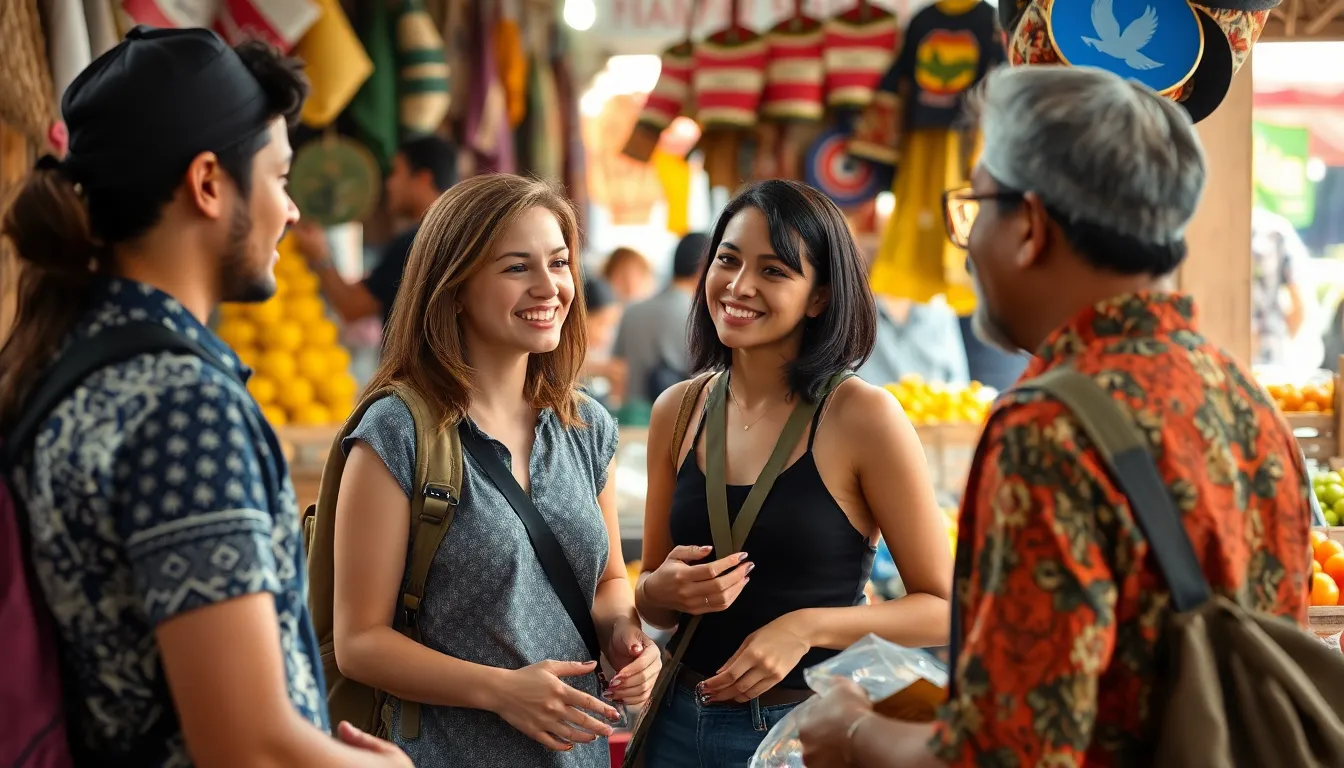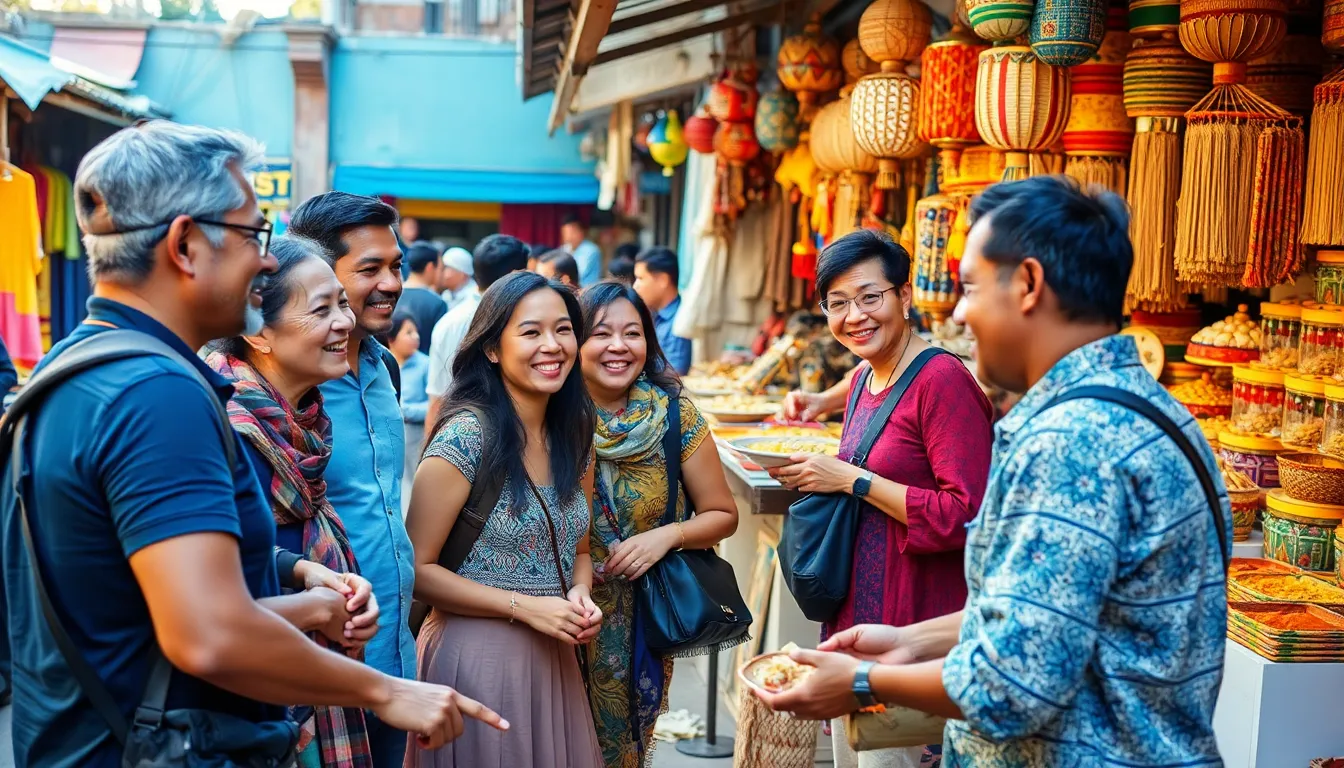Traveling isn’t just about visiting new places; it’s about diving into the heart of different cultures. Cultural immersion transforms a trip from a mere vacation into a rich experience filled with learning and connection. Whether exploring bustling markets or savoring local delicacies, engaging with a culture can deepen understanding and appreciation of the world.
To truly embrace a new culture, one must go beyond typical tourist activities. It’s about interacting with locals, participating in traditions, and stepping outside comfort zones. This article offers essential tips for those eager to immerse themselves fully in a culture, ensuring every moment spent abroad is meaningful and memorable. From language basics to cultural etiquette, these insights will help travelers navigate their journeys with confidence and respect.
Table of Contents
ToggleUnderstanding Cultural Immersion
Cultural immersion involves deeply engaging with a new culture during travel. It allows travelers to connect meaningfully with the local way of life.
Definition and Importance
Cultural immersion refers to fully experiencing and participating in the customs, traditions, and daily activities of a culture. This approach enriches the travel experience beyond superficial sightseeing. Understanding local perspectives fosters appreciation and respect for different ways of life.
Benefits of Cultural Immersion
- Enhanced Communication: Learning basic phrases in a local language improves interactions and strengthens connections with residents.
- Increased Empathy: Engaging with diverse cultural practices broadens worldviews, fostering understanding and compassion toward others.
- Authentic Experiences: Participating in local customs, such as festivals or cooking classes, provides genuine insights that standard tourism lacks.
- Personal Growth: Overcoming challenges related to cultural differences enhances adaptability and strengthens problem-solving skills.
- Meaningful Relationships: Building friendships with locals creates lasting memories and enriches the travel experience.
Preparation for Cultural Immersion

Preparation is crucial for a successful cultural immersion experience. Engaging deeply with a culture requires understanding its nuances and practices prior to arrival.
Researching the Culture
Researching the culture provides valuable insights that enhance the travel experience. Travelers should explore the country’s history, customs, and social norms. Websites like the CIA World Factbook, Culture Shock books, and cultural exchange forums offer detailed information. Local news outlets and blogs can also give updates on current events and social issues. Observing cultural events through documentaries or films broadens perspectives, while reading literature from local authors fosters deeper connections.
Learning the Language Basics
Learning the language basics facilitates communication and shows respect for the local culture. Travelers should focus on essential phrases, greetings, and polite expressions. Tools like language learning apps, flashcards, and phrasebooks offer convenient ways to gain language skills. Practice with native speakers, either online or in-person, enhances fluency and builds confidence. Understanding the cultural context of language use, such as gestures and tone, further enriches interactions. These efforts make for more meaningful connections and foster mutual understanding.
Engaging with the Community
Engaging with the community enhances cultural immersion by fostering connections and understanding local traditions. Active participation in community activities enriches the travel experience.
Participating in Local Events
Participating in local events provides authentic insights into a culture’s values and traditions. Travelers can attend festivals, markets, and celebrations promoting community involvement. Event calendars are often available online or through local tourist information centers. Engaging in music festivals, food fairs, and traditional ceremonies allows for interaction with locals, enriching understanding.
Volunteering Opportunities
Volunteering offers profound ways to connect with the community while providing assistance. Numerous organizations seek help from tourists for local development, environmental initiatives, and social services. Engaging in activities such as teaching English, participating in conservation efforts, or supporting local NGOs leads to hands-on experiences and meaningful connections. Resources like the United Nations Volunteers website and local community boards provide listings of available opportunities.
Exploring Local Cuisine
Exploring local cuisine offers travelers a gateway to a culture’s heritage and traditions. Engaging with food enhances the overall cultural immersion experience.
Trying Authentic Dishes
Travelers should seek out authentic dishes that reflect regional flavors and culinary traditions. Local markets and family-owned restaurants often serve the most genuine meals. He or she can ask locals for recommendations on specialty dishes typical to the area. Tasting street food provides an excellent opportunity to sample local street vendors’ creations. Notable examples include tacos from Mexico, pho from Vietnam, and curry from India. Each dish typically carries a unique story, deepening the cultural connection.
Cooking Classes and Food Tours
Participating in cooking classes allows travelers to learn traditional cooking techniques and recipes from local chefs. These classes often include a visit to local markets to select fresh ingredients. Food tours offer guided tastings at various eateries, showcasing a variety of dishes and local delicacies. Both experiences enrich understanding of the culinary landscape and encourage engagement with locals in a shared learning environment. Options for cooking classes and food tours are widely available in major cities and rural areas alike, making these activities accessible to travelers.
Embracing Traditions and Customs
Engaging with a culture’s traditions and customs deepens travel experiences. Travelers should actively seek ways to immerse themselves in the local lifestyle and partake in meaningful activities.
Festivals and Celebrations
Participating in local festivals and celebrations reveals a culture’s spirit and values. Travelers often experience vibrant parades, music, dance, and traditional ceremonies that showcase regional heritage. Engaging in these events enables connections with locals and offers insights into customs passed down through generations. For instance, joining a Diwali celebration in India or attending Carnival in Brazil fosters a shared sense of community and highlights unique cultural expressions.
Understanding Social Norms
Understanding social norms enhances interactions with locals and facilitates smoother communication. Familiarity with customs, gestures, and etiquette prevents misunderstandings and shows respect for the local way of life. Travelers benefit from researching topics such as appropriate greetings, dress codes, and dining etiquette. For example, in Japan, bowing is customary, while in many Middle Eastern countries, sharing food is a gesture of hospitality. Observing and adapting to these practices enriches the travel experience and builds rapport with local communities.
Documenting Your Experience
Documenting experiences during cultural immersion enhances understanding and creates lasting memories. Two effective methods for this are keeping a journal and sharing experiences on social media.
Keeping a Journal
Keeping a journal serves as a personal record of reflections and insights. It allows travelers to jot down daily observations, experiences, and emotions, capturing the nuances of local culture. By writing about interactions with locals, descriptions of local customs, and thoughts on new experiences, travelers create a valuable resource for future recalls. Regularly noting specific events or interactions reinforces learning and appreciation for the culture. Additionally, travelers can include sketches, ticket stubs, or local maps to enrich their journals.
Sharing on Social Media
Sharing experiences on social media connects travelers with their networks and encourages cultural exchange. Posting photos, videos, and stories about interactions with locals or cultural events highlights unique aspects of a destination. Engaging with followers through comments and discussions fosters dialogue about different cultures. Using relevant hashtags can help discover other travelers’ experiences and connect with like-minded individuals. By sharing authentic moments, travelers inspire others to embrace cultural immersion while broadening their own perspectives.
Embracing cultural immersion transforms travel into a profound journey. It allows travelers to connect deeply with the essence of a place and its people. By engaging with locals and participating in authentic experiences, individuals gain insights that go beyond typical sightseeing.
Preparation plays a vital role in this process. Understanding cultural nuances and learning basic language skills can enhance interactions and foster respect. Active participation in community events and local traditions enriches the experience further, creating lasting memories and meaningful relationships.
Ultimately, cultural immersion not only broadens perspectives but also cultivates empathy and appreciation for the diversity of human experiences. Travelers who commit to this approach will find that their adventures become more rewarding and impactful.




